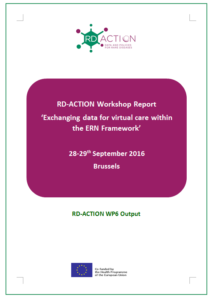- Report of RD-ACTION Workshop ‘Exchanging Data for Virtual Care within the ERN Framework’
- ‘Highlights and Conclusions’ Summary Report
- Agenda
- Presentations from the workshop may be downloaded here
- Return to the European Reference Networks page
Executive Summary of the Workshop
The topic for this workshop was selected because at the heart of the ERN concept is the opportunity to provide healthcare through virtual means, enabling expertise to travel as opposed to patients or physicians, where possible and appropriate. The workshop was very well attended, with over 55 participants across the two days: 21 Applicant Networks; 10 European Commission DG SANTE experts leading various aspects of the ERN work, including Mr Andrzej Rys and Enrique Terol; 10 European Patient Advocacy Groups (ePAGs); experts from RD-ACTION and several other projects with experience and expertise in the standardisation of data in the RD field; and a legal expert with many years of experience in addressing the legal challenges facing the field of eHealth, Petra Wilson.
The workshop focused on several aspects relating to the organisation and execution of ‘virtual consultations’ for complex patient presentations requiring access to the pooled expertise of the ERN:
- The form such encounters might take were explored (for example a real-time gathering of experts through virtual systems, the ability to review uploaded case information in the professional’s own time through a secure platform, etc.)
- The legal issues around data protection -especially in view of the new General Data Protection Regulation- and the legal, ethical and social issues relating to consent for the sharing of data in the ERN framework
- Practical advice on the organisation and execution of efficient and effective virtual consultations, from colleagues engaged in this work at present
- Perspectives on how patients will enter/ be ‘referred’ to the expertise of the ERN for virtual care
- Experiences and recommendations on the standardisation of data in the RD field, in terms of disease coding and ontologies for phenotypic (clinical) information, to explore the good practices which should be embedded in the ERNs and identify additional standards of importance to the ANCs.

